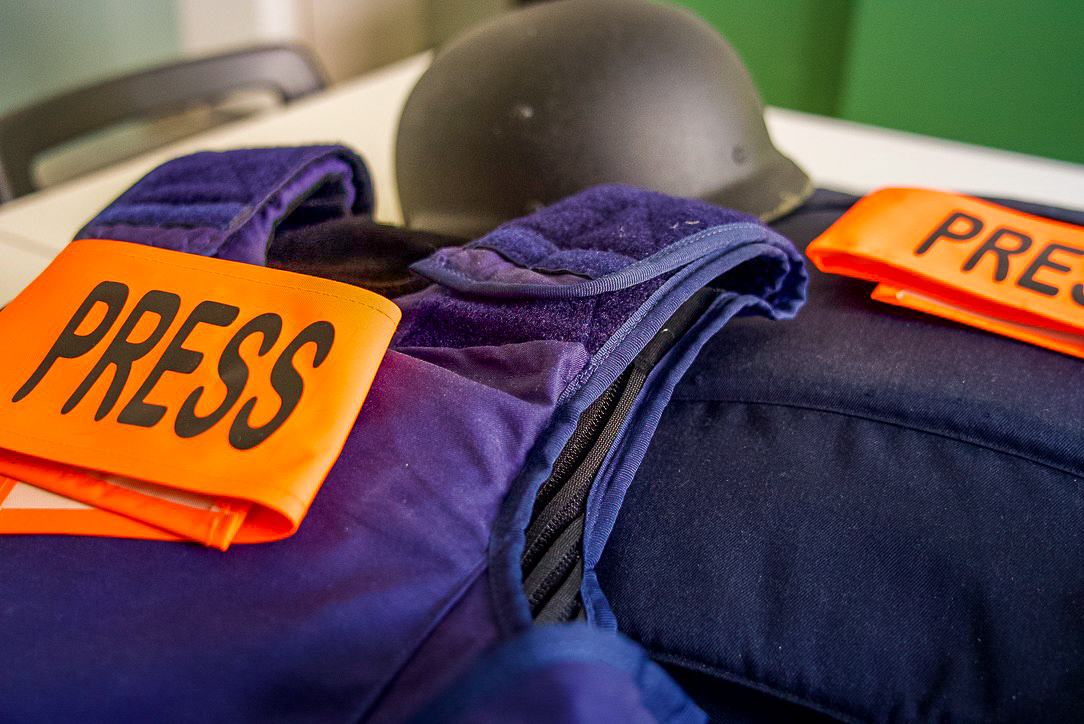Press Freedom Centers

What is a Press Freedom Center?
In contexts of major crises affecting press freedom, and in order to provide journalists and media outlets with the equipment, assistance, and resources necessary to pursue their mission of informing the public as safely as possible, RSF has opened several Press Freedom Centres.
RSF’s Press Freedom Centres provide support and emergency assistance to both local and international journalists and media. Depending on the context and the needs identified, psychological, legal, and financial support may be offered, as well as protective or professional equipment. Training sessions can also be organized to help journalists carry out their work in extreme contexts, particularly on physical safety, first aid, digital security, psychological safety, and more.
Kyiv Press Freedom Center
Since February 24, 2022, marking the start of Russia’s full-scale invasion of Ukraine, 13 journalists have been killed, at least 47 injured while reporting, and 28 Ukrainian journalists remain detained by Russia. While the situation is particularly alarming for journalists in occupied areas, all Ukrainian journalists and media outlets have been severely affected by the war and its consequences.
RSF’s first Press Freedom Centre was established in Lviv on March 10, 2022, just days after the invasion began. On May 17, 2022, RSF expanded its activities to Kyiv by opening a second Centre there, in partnership with the Institute of Mass Information (IMI), RSF’s longstanding partner.
Since their creation, RSF has supported more than 2,000 journalists and 229 media outlets through its Centres, in partnership with several Ukrainian organizations. To better adapt to journalists’ needs, the Kyiv Centre has centralized all activities and equipment since December 2024, following the closure of the Lviv Centre.
Click here to learn more about the Kyiv Press Freedom Center or contact [email protected].
Beirut Regional Press Freedom Center
To support journalists in the region affected by the war in Gaza, RSF inaugurated a regional Press Freedom Centre in Beirut, Lebanon’s capital, on March 21, 2024. For the establishment of the Beirut Press Freedom Centre, RSF partnered with its long-standing local partner, the Samir Kassir Foundation.
In just one year, the Beirut Press Freedom Centre has become a key actor in protecting and supporting journalists in the region. Thanks to its strong local presence and network of partners, the Centre has assisted more than 200 journalists during this period, providing them with a safe space where they can meet, receive training, work, and access equipment.
In an environment that remains unstable and marked by high tensions, the Centre is responding to growing needs by offering a wide range of services, including training adapted to the local context and tailored to journalists, psychological support, legal assistance, as well as the loan and distribution of protective equipment (bulletproof vests, helmets, first aid kits).
Click here to learn more about the Beirut Centre, or contact [email protected].
Myanmar Press Freedom Project (MPFP)
Since the coup d’état of February 1, 2021, Myanmar’s military junta has unleashed a brutal crackdown on the media: 7 journalists have been executed, more than 150 imprisoned, and at least 50 remain behind bars. This violence has triggered a massive exodus: more than 60 Myanmar-based media outlets are now operating from abroad, mainly from Thailand.
It is in this context that RSF launched, in October 2024, a support mechanism for exiled Burmese journalists. Initially deployed in Chiang Mai, in northwestern Thailand, the program expanded its activities to Mae Sot in July 2025, a border town with Myanmar, with the assistance of its partner Docu Athan. This extension enables RSF to remain close to Burmese journalists in exile or in transit, and to strengthen a strategic border hub dedicated to press freedom in the region.
This mechanism, known as the Myanmar Press Freedom Project (MPFP), is based on a flexible and decentralized approach, similar to that of the Press Freedom Centres in Kyiv and Beirut.
Since its launch, the MPFP has supported more than 400 journalists by providing essential assistance through the donation of professional and technical equipment (laptops, phones, solar batteries, etc.), the provision of VPNs and satellite connections, and the delivery of training sessions tailored to their needs in the field. This support is directed both at journalists working in exile and those still active in Myanmar, often under precarious and dangerous conditions.
Click here to learn more about the Myanmar Press Freedom Project, or contact [email protected].
